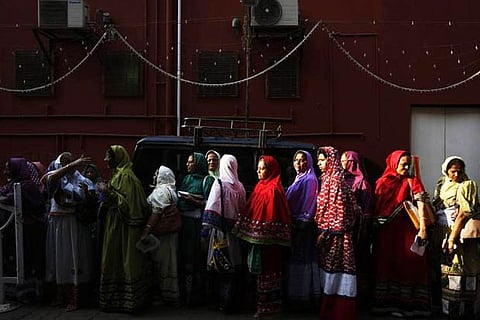

New Delhi
A bench headed by Chief Justice Dipak Misra was responding to submissions of senior advocate AM Singhvi, appearing for a Muslim group, that this was an old practice which formed part of "essential religious practice" and, hence, was not open to judicial scrutiny.
Singhvi told the bench, also comprising justices AM Khanwilkar and DY Chandrachud, that the practice was protected under Article 25 and 26 of the Constitution which deals with religious freedom.
However, the bench differed, saying, "The fact that this is being practised from 10th century is not sufficient for us to hold that this is the essential part of religious practice."
This practice will have to pass the test of constitutional morality, the bench said.
Singhvi said that Dawoodi Bohras have been the most progressive and educated among the Muslim communities and the practice is not so grave as has been made out by those opposing it.
He said the practice has also been an essential religious practice which was protected under Article 25 (freedom of conscience and free profession, practice and propagation of religion) of Constitution.
The females of the community are educated and moreover, it also does not practice the instant triple talaq for divorce which has been banned by the apex court.
The hearing in the matter remained inconclusive and would resume on August 27.
Earlier, the court had made it clear that it cannot direct doctors to perform genital mutilation of minor girls of the community and had questioned the "scientific justification", if any, behind the procedure.
It had questioned the practice saying that there was hardly any rationale behind it as a girl child is forced to undergo it due to non-medical reasons.
Attorney General KK Venugopal, appearing for the Centre, had reiterated the government's stand that it was opposing the practice and said that this has been banned in many countries like the US, the UK, Australia and around 27 African nations.
The practice causes irreparable harm to girl children and has many health repercussions, the top law officer said and referred to Article 25 to highlight the point that a religious practice can be stopped if it was against "public order, morality and health".
The bench was hearing the PIL filed by Delhi-based lawyer Sunita Tiwari against the practice in the community.
Senior advocate Indira Jaising, appearing for Masooma Ranalvi, a lawyer who herself has been a victim of mutilation, had said the practice of "removal of the clitoral hood" for non-medical purposes of a minor constituted an offence under the IPC and the Protection of Children from Sexual Offences Act (POCSO Act).
The court had on May 8 agreed to examine the issues raised in the PIL by saying that the practice of female genital mutilation was "extremely important and sensitive".
Tiwari, in her plea, sought a direction to the Centre and the states to "impose a complete ban on the inhuman practice" of 'khatna' or "female genital mutilation" throughout the country.
The plea has sought a direction to make it an offence on which the law enforcement agencies can take cognisance on their own. It has also sought to make the offence "non-compoundable and non-bailable" with provision for harsh punishment.
The practice of female genital mutilation resulted in "serious violations of basic fundamental rights of the victims who in these cases are minors," the plea said.
Female genital mutilation is performed "illegally upon girls (between five years and before she attains puberty)" and is against the "UN Convention on the Rights of the Child, UN Universal Declaration of Human Rights of which is India is a signatory", the plea said, adding the practice caused "permanent disfiguration to the body of a girl child".
"The practice of 'khatna' or female genital mutilation or 'Khafd' also amounts to causing inequality between the sexes and constitutes discrimination against women. Since it is carried out on minors, it amounts to serious violation of the rights of children as even minors have a right of security of person, right to privacy, bodily integrity and the freedom from cruel, inhumane or degrading treatment," the plea said.
"It violates the rights of the child and human rights. It also violates the Universal Declaration of Human Rights and is a crime in the United States of America under the Illegal Immigration Reform and Immigrant Responsibility Act of 1996 and now a crime in Australia and some other countries as well," it claimed.
Visit news.dtnext.in to explore our interactive epaper!
Download the DT Next app for more exciting features!
Click here for iOS
Click here for Android